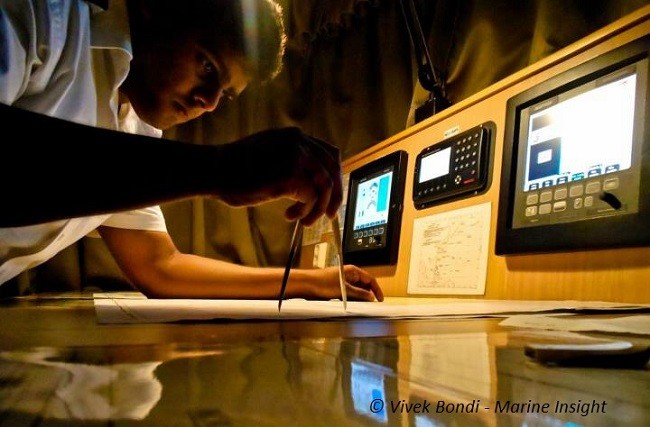In order to have a successful career at sea, it is important you make the right decisions at the start. While starting off at a maritime institute, it is only natural to be confused with regards to what stream to choose for further studies, especially for those that do not have direct access to anyone from the industry.
Degrees or diplomas in nautical science or marine engineering are two ways in which one can get a job as an officer on merchant ships.
There have been instances wherein an individual has chosen one stream only to realise that it doesn’t suit their academic inclination or the prospects that they have for their career at sea, wanting to opt out of it or into another. It is therefore extremely important that one knows in advance what field they are going to pursue and what job they would be doing later on while on the ship.
So what is the difference between nautical science and marine engineering degrees? How would you know which one to choose and what to expect from that?
Difference between Marine Engineering and Nautical Science Degrees
Nautical Science
Choosing one’s career in nautical science prepares a person to become a deck officer. Nautical science is a three years course that results in an undergraduate degree or diploma after which the student joins a ship as trainee cadet officer (commonly referred to as a deck cadet). After completing sufficient time at the sea (experience/sea time required as a deck cadet varies with the course pursued at the undergraduate level) and clearing required certificate of competency exams, the cadet becomes eligible to be employed as a navigating officer onboard a merchant ship. This first promotion comes with the designation of a Third Mate (or Junior Officer in some cases wherein the shipping company might require additional experience before becoming an OOW).
Theoretical and practical knowledge required for seamanship, chart work, collision prevention, navigation, bridge equipment & watchkeeping, cargo handling & stowage, ship stability, naval architecture (elementary), meteorology, marine signalling and ship maintenance and operation is imparted during the three years course among others, along with exposure to other areas that are necessary for managerial skills. Hands-on training is extremely important as a deck officer and thus detailed procedure and maintenance techniques of importance deck machinery is an integral part of this course.
Several modular courses that are required to join a ship are also included in the syllabus of nautical science which is mandatory as per the IMO STCW convention. At the very basic level, these courses are Personal Survival Techniques, Fire Fighting and Fire Prevention, Elementary First Aid, Personal Safety and Social Responsibility. An advanced version of these courses is to be completed prior to appearing for the certificate of competency examinations. These are short courses that range between 2-5 days.
Marine Engineering
Marine engineering is a field that deals with the engineering aspect of the maritime industry. Like any conventional engineering course, marine engineering is a four-year course which prepares an individual to become an engineer on ship.
What is the Difference between Nautical Science and Marine Engineering?
In order to have a successful career at sea, it is important you make the right decisions at the start. While starting off at a maritime institute, it is only natural to be confused with regards to what stream to choose for further studies, especially for those that do not have direct access to anyone from the industry.Degrees or diplomas in nautical science or marine engineering are two ways in which one can get a job as an officer on merchant ships.
There have been instances wherein an individual has chosen one stream only to realise that it doesn’t suit their academic inclination or the prospects that they have for their career at sea, wanting to opt out of it or into another. It is therefore extremely important that one knows in advance what field they are going to pursue and what job they would be doing later on while on the ship.
So what is the difference between nautical science and marine engineering degrees? How would you know which one to choose and what to expect from that?
Difference between Marine Engineering and Nautical Science Degrees
Nautical Science
Choosing one’s career in nautical science prepares a person to become a deck officer. Nautical science is a three years course that results in an undergraduate degree or diploma after which the student joins a ship as trainee cadet officer (commonly referred to as a deck cadet). After completing sufficient time at the sea (experience/sea time required as a deck cadet varies with the course pursued at the undergraduate level) and clearing required certificate of competency exams, the cadet becomes eligible to be employed as a navigating officer onboard a merchant ship. This first promotion comes with the designation of a Third Mate (or Junior Officer in some cases wherein the shipping company might require additional experience before becoming an OOW).
Image for representation purpose only.
Theoretical and practical knowledge required for seamanship, chart work, collision prevention, navigation, bridge equipment & watchkeeping, cargo handling & stowage, ship stability, naval architecture (elementary), meteorology, marine signalling and ship maintenance and operation is imparted during the three years course among others, along with exposure to other areas that are necessary for managerial skills. Hands-on training is extremely important as a deck officer and thus detailed procedure and maintenance techniques of importance deck machinery is an integral part of this course.
Several modular courses that are required to join a ship are also included in the syllabus of nautical science which is mandatory as per the IMO STCW convention. At the very basic level, these courses are Personal Survival Techniques, Fire Fighting and Fire Prevention, Elementary First Aid, Personal Safety and Social Responsibility. An advanced version of these courses is to be completed prior to appearing for the certificate of competency examinations. These are short courses that range between 2-5 days.
Marine Engineering
Marine engineering is a field that deals with the engineering aspect of the maritime industry. Like any conventional engineering course, marine engineering is a four-year course which prepares an individual to become an engineer on ships.Marine engineering is all about machinery on ships, boats, yachts, or any sea going vessels. There are several other technical streams that sprout out from this field. The curriculum of the course focuses on teaching the specialized knowledge of both theoretical and practical marine and mechanical engineering. Greater importance is given to impart skills and competencies that are required to operate and maintain machinery on board ships.
Credits: depositphotos.com
The subjects taught in the first and second year of the course are almost the same as those taught in conventional mechanical engineering. The main aim is to introduce engineering sciences to the students and to make them understand the applications of those sciences in various aspects of marine engineering.
The third and fourth years are totally dedicated to imparting marine technical knowledge. Both theoretical and practical aspects of marine machinery are covered with a special focus on ship’s operation and maintenance of marine machinery. Practical knowledge through laboratory and workshop training is provided throughout the four years of the program so that students get hands-on knowledge of dismantling and maintenance of machines on ships.
Upon completion of the course at the Institute, the engineer cadet has to spend the requisite time at sea to gather experience which is mandatory to appear for the engineering certificate of competency examinations. Clearing these exams results in obtaining the compulsory ‘ticket’ to be a certified engineer officer on board.
Both streams have their niche subjects and require a genuine interest from the side of the candidate to successfully complete the shore based aspect as well as to become a skilled officer in the future. Every merchant navy aspirant must do thorough research on the stream they would wish to pursue in the future to ensure that the interest in the studies and the field never wanes.
Disclaimer: The authors’ views expressed in this article do not necessarily reflect the views of Merchant Navy Zone. Data and charts, if used, in the article have been sourced from available information and have not been authenticated by any statutory authority. The author and Merchant Navy Zone do not claim it to be accurate nor accept any responsibility for the same. The views constitute only the opinions and do not constitute any guidelines or recommendation on any course of action to be followed by the reader.





No comments:
Post a Comment